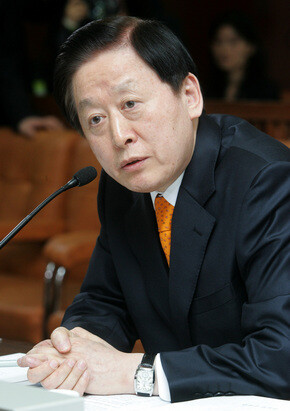hankyoreh
Links to other country sites 다른 나라 사이트 링크
Government response to Kim Jong-il rumors points to internal problems

Appearing before a National Assembly Diplomacy, Trade and Unification Committee meeting yesterday, Unification Minister Kim Ha-joong said it was not appropriate to mention anything about North Korean leader Kim Jong-il’s health before the North does, even if there is credible information. He said that from the North’s perspective, continued mention of Kim’s illness despite official denials by Pyongyang could be seen as slander of its leader or a hostile act. He stressed that discussions or reports of the possibility of North Korea’s collapse, including contingency plans, could worsen inter-Korean relations and harm the national interest. Foreign Minister Yu Myung-hwan, too, fended off persistent questioning about Kim’s health, saying public mention of the issue was inappropriate.
On the other hand, Vice Culture Minister Shin Jae-min revealed that Prime Minister Han Seung-soo said at a Cabinet meeting September 17 that political uncertainty within North Korea was increasing, and that nobody knew what situation might unfold. Because of this, he ordered that thorough preparations be made for any scenario.
About this, a former long-time, high-ranking government figure said that in looking at the government’s response to rumors surrounding Kim’s health, with each ministry going in its own direction, there is a serious problem with its policy coordination system. He added that if a major diplomatic or security matter develops, the government can prevent unnecessary confusion and overreactions only if it presents a unified message in accordance with a plan arrived upon through inter-ministry coordination based on the intelligence and information obtained.
As to the background to the problem, experts cite the absence of press guidelines about North Korean affairs, a weak policy coordination system resulting from the transformation of the council of security-related ministers into a council in name only, and the ministerial territoriality and lack of inter-ministry and inter-agency intelligence-sharing resulting from the National Intelligence Service’s solo briefs of the president.
Please direct questions or comments to [englishhani@hani.co.kr]
Editorial・opinion
![[Column] Park Geun-hye déjà vu in Yoon Suk-yeol [Column] Park Geun-hye déjà vu in Yoon Suk-yeol](https://flexible.img.hani.co.kr/flexible/normal/500/300/imgdb/original/2024/0424/651713945113788.jpg) [Column] Park Geun-hye déjà vu in Yoon Suk-yeol
[Column] Park Geun-hye déjà vu in Yoon Suk-yeol![[Editorial] New weight of N. Korea’s nuclear threats makes dialogue all the more urgent [Editorial] New weight of N. Korea’s nuclear threats makes dialogue all the more urgent](https://flexible.img.hani.co.kr/flexible/normal/500/300/imgdb/original/2024/0424/7317139454662664.jpg) [Editorial] New weight of N. Korea’s nuclear threats makes dialogue all the more urgent
[Editorial] New weight of N. Korea’s nuclear threats makes dialogue all the more urgent- [Guest essay] The real reason Korea’s new right wants to dub Rhee a founding father
- [Column] ‘Choson’: Is it time we start referring to N. Korea in its own terms?
- [Editorial] Japan’s rewriting of history with Korea has gone too far
- [Column] The president’s questionable capacity for dialogue
- [Column] Are chaebol firms just pizza pies for families to divvy up as they please?
- [Column] Has Korea, too, crossed the Rubicon on China?
- [Correspondent’s column] In Japan’s alliance with US, echoes of its past alliances with UK
- [Editorial] Does Yoon think the Korean public is wrong?
Most viewed articles
- 1[Column] Park Geun-hye déjà vu in Yoon Suk-yeol
- 2Will NewJeans end up collateral damage in internal feud at K-pop juggernaut Hybe?
- 3Why Korea shouldn’t welcome Japan’s newly beefed up defense cooperation with US
- 4N. Korean hackers breached 10 defense contractors in South for months, police say
- 5[Guest essay] The real reason Korea’s new right wants to dub Rhee a founding father
- 6Thursday to mark start of resignations by senior doctors amid standoff with government
- 7[Editorial] New weight of N. Korea’s nuclear threats makes dialogue all the more urgent
- 8[Column] ‘Choson’: Is it time we start referring to N. Korea in its own terms?
- 9Kim Jong-un expressed ‘satisfaction’ with nuclear counterstrike drill directed at South
- 10The dream K-drama boyfriend stealing hearts and screens in Japan